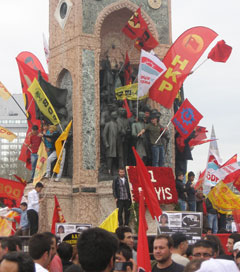May 1 celebrations occur in many places around the world. This year, I was fortunate to witness a very vigorous celebration in Taksim Square, Istanbul. Over one million people, representing various organizations ranging from the Turkish Communist Party to unions, the Kurdish party, women's organizations and Islamic socialists, crammed the center. Members of the police force also massed in and around the center, as the whole area was cordoned off and people passing through had to go through security checks. The vitality of the whole gathering was enhanced by the strains of invigorating modern music and chants, familiar to those who have experienced the cauldron of a Fenerbahce, Galatasaray, Besiktas or Ataturk football (soccer) stadium on match day, and could be felt throughout. Many youth – and especially young women, many in their teens – made their presence felt. These youth clamored for change and an end to corruption and scandals (in the Turkish case, there was also a scandal concerning public exams) and protested the precarious living available in neoliberal times. These now nearly universal themes were certainly addressed in several May Day celebrations around the world. Taksim Square on May 1 this year provided ample evidence of youth as the symbol of hope for a better world.
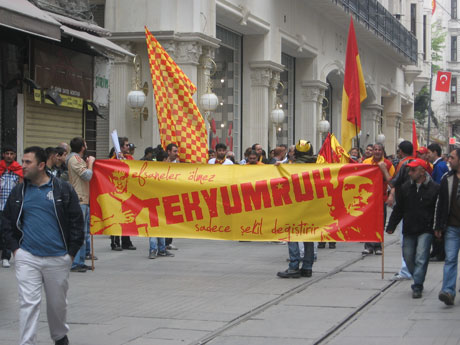
Taksim Square. (Photo: Mario Cardona)
Turkey's celebration of May 1 as international workers day was of particular significance. This was only the third time this celebration was held – following its long ban, finally lifted by the government in 2009. In 1977, a similar celebration was marred by fatal attacks which left dozens of protesters dead as unknown gunmen opened fire. The victims' names were called out on May 1, 2011, by a famous Turkish actor, in a poignant moment which brought to mind the country's tragic past – including a 1980 military coup that paved the way for the onset of neoliberalism (shades of Chile seven years earlier). The memory of protests and violence also led one to remember what was going on all over the region with the struggle for work and dignity, and greater democratic openings, in Tunisia, Egypt, Syria, Yemen, Bahrain and Libya. The strong presence of Kurds at the Taksim demonstration also underlined a concept of democracy characterized by unity in diversity and in which the rights of minorities are recognized. In Turkey, this May Day was also marked by the launching of a new satellite and web-streamed television channel (Al-Jazeera style), IMC TV, which devoted ample coverage to May Day celebrations and their significance around the world.
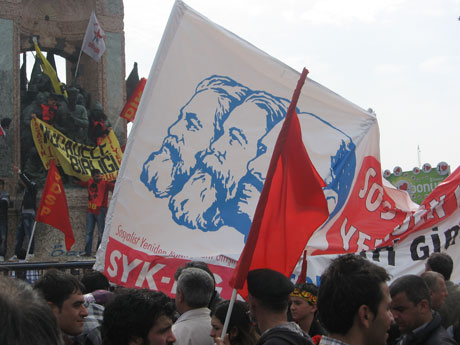
Taksim Square. (Photo: Mario Cardona)
This May Day celebration ought to have brought to light the terrible conditions in which the members of the working class and once-lower-middle classes are living – a situation in which the old fashion of distinguishing between the “haves” and “have-nots” has been changed, as Henry Giroux and others have argued, into the more harrowing distinction between “who has the right to live” and who is “disposable” and, therefore, denied the right of life. This is a point Giroux constantly makes.[1] He reproduces a very apt line from Judith Butler,[2] namely the question of, “which lives count as human and as living, and which do not.” We are certainly living in a period in which many people constitute what the Polish sociologist Zygmunt Bauman calls the “human waste disposal” category,[3] as manifested, for example, in the United States in the aftermath of Hurricane Katrina, and illuminated in certain provinces and states throughout the world through cutbacks in social spending – for example, as in one documented case of cuts in spending on lifesaving heart transplants. This attempt to refashion a leaner state is hypocritical, given the way the so-called “lean” state has bailed out banks and other enterprises in times of financial crises.
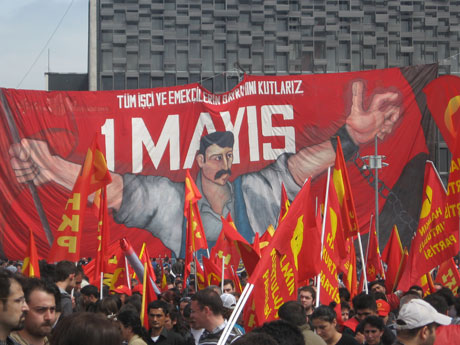
Taksim Square. (Photo: Mario Cardona)
May Day also raises the issue of what worker solidarity means in this day and age. In this respect, the presence of women and people from different ethnic groups in the Taksim manifestation contrasted with the symbolic images that loomed large on billboards and banners there. The image of a mustached, muscular worker hearkened back to a homogenizing masculine concept of the worker, specifically the sturdy peasant or construction worker of old. Surely, a new and more inclusive language and form of representation of work and workers is called for. The Turkish Communist Party's banner, bearing the figure of Stalin, looked ominous and out of place among the youth struggling against the trampling of human rights exemplified by the 1977 tragedy, subsequent banning of May Day celebrations and infamous military coup. One would expect that any current notion of socialism (and socialism remains on the agenda during the present global economic scenario and continues to render ludicrous Fukuyama's old claim concerning the “end of history”) should be a creatively forward-looking one, marked by a new language – not one which hearkens back to a past period, exemplified by Stalin, of “socialism” in its worst totalitarian, murderous and ossified forms.
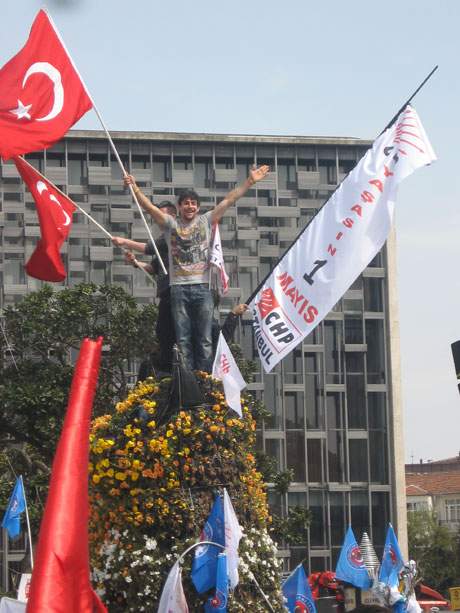
Taksim Square. (Photo: Mario Cardona)
On a more international level, the notion of worker solidarity in this day and age should traverse national boundaries and encompass the plight of immigrants as well as that of the any so-called or actual autochthonous population. When I was invited in 2008 to speak on the significance of Workers' Day at a seminar organized by the largest trade union in my country, I emphasized this aspect of worker solidarity. The kind of worker solidarity called for is international – not national. The latter is very much the hallmark of National Socialism with its racist, ethnocentric underpinnings. Readers need no reminding of that approach's historical outcome.
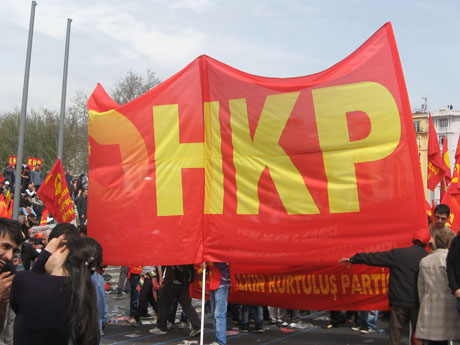
Taksim Square. (Photo: Mario Cardona)
This is one of the greatest challenges facing those committed to a genuinely democratic socialist politics in this region. Work of an unmistakably educational nature is required, and the kind of educational work in which one must engage, in the contemporary context, is a lengthy one. With local working class people living in a state of precariousness being the ones most likely to suffer from the devastating effects of neoliberal globalization policies, this work becomes ever more urgent. Unless such an educational strategy is developed, it is more likely that working class people become attracted to the kind of populist right-wing and often neofascist discourse that plays on their fears and leads to further segmentation and antagonism among workers on ethnic or other lines of division. This can result in misplaced alliances and obfuscation of the fact that both they and immigrants share a common fate: that of oppression and being subaltern victims of a ruthless process of capitalist exploitation. There have been cases in which traditional socialist parties, once champions of the laboring classes' cause, have been accused of shunning the responsibility of working toward fostering interethnic solidarity among workers. Their apparent rationale is fear of losing electoral votes, a situation which bodes ill for a genuinely democratic politics predicated on worker solidarity across ethnic and national, and not only class and gender, lines.

Taksim Square. (Photo: Mario Cardona)

Taksim Square. (Photo: Mario Cardona)
1. Giroux, H.A. (2010) “Hearts of Darkness. Torturing Children in the War on Terror,” Boulder, Colorado: Paradigm Publishers.
2. Butler, J. (2009) “Frames of War. When is Life Grievable?,” London: Verso.
3. Bauman, Z. (2006), “The crisis of the human waste disposal industry.” In Macedo, D. and Gounari, P. (Eds.) “The Globalization of Racism.” Boulder, Colorado: Paradigm Publishers.
Our most important fundraising appeal of the year
December is the most critical time of year for Truthout, because our nonprofit news is funded almost entirely by individual donations from readers like you. So before you navigate away, we ask that you take just a second to support Truthout with a tax-deductible donation.
This year is a little different. We are up against a far-reaching, wide-scale attack on press freedom coming from the Trump administration. 2025 was a year of frightening censorship, news industry corporate consolidation, and worsening financial conditions for progressive nonprofits across the board.
We can only resist Trump’s agenda by cultivating a strong base of support. The right-wing mediasphere is funded comfortably by billionaire owners and venture capitalist philanthropists. At Truthout, we have you.
We’ve set an ambitious target for our year-end campaign — a goal of $230,000 to keep up our fight against authoritarianism in 2026. Please take a meaningful action in this fight: make a one-time or monthly donation to Truthout before December 31. If you have the means, please dig deep.
